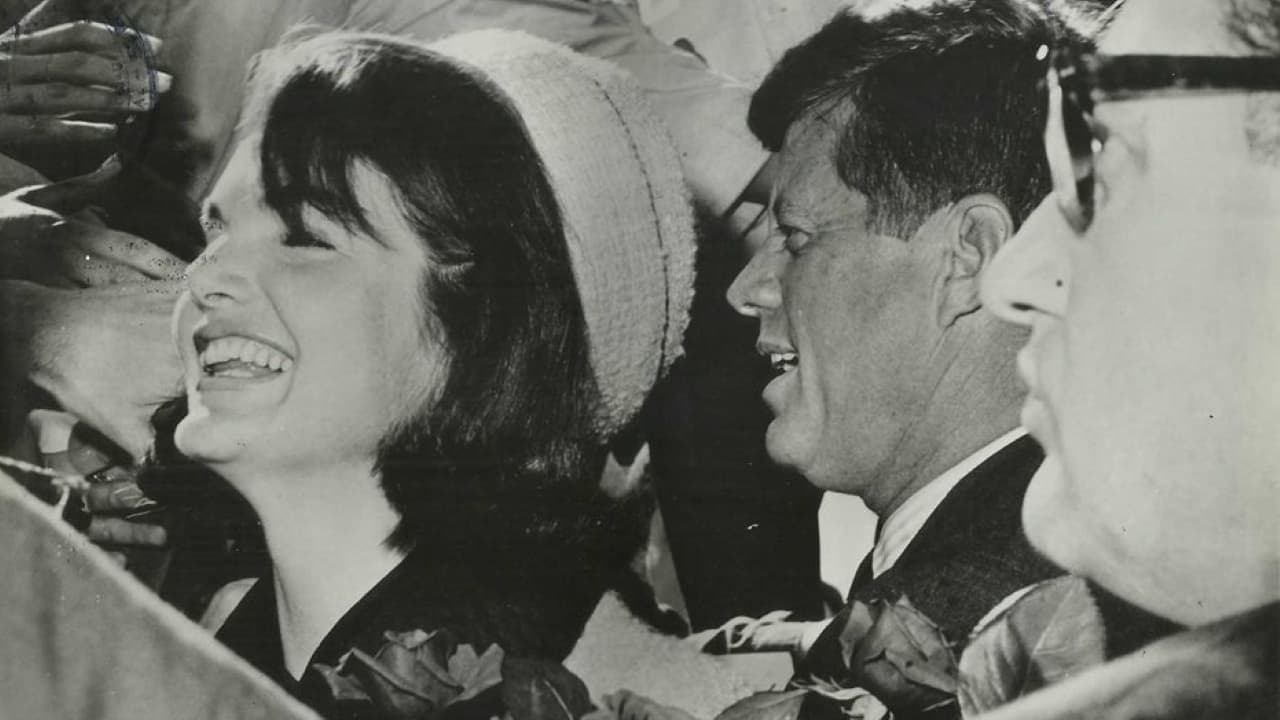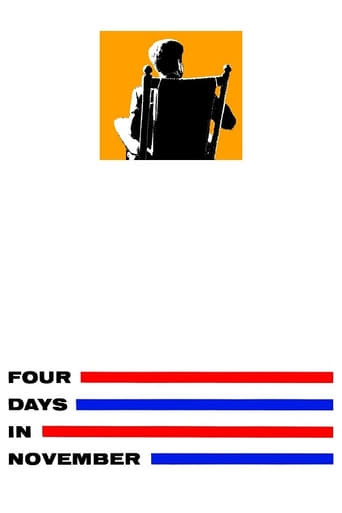



Don't Believe the Hype
A lot of perfectly good film show their cards early, establish a unique premise and let the audience explore a topic at a leisurely pace, without much in terms of surprise. this film is not one of those films.
View MoreWhile it is a pity that the story wasn't told with more visual finesse, this is trivial compared to our real-world problems. It takes a good movie to put that into perspective.
View MoreThe thing I enjoyed most about the film is the fact that it doesn't shy away from being a super-sized-cliche;
View MorePowerful document of the four days in November of 1963 that haunt our nation to this day. Telling in how it shows a grief stricken nation mourning a fallen hero that led America out of the brink of war and tried to be a force in civil rights, Richard Basehart's matter of fact narration seemed fitting to take us through the opening highs of that charismatic personality and charming smile that JFK exuded while on tour through Texas (Houston and Ft Worth before Dallas) to the tragic, horrible lows of his assassination and funeral ceremony as family, diplomats, friends, politicians, and the citizens of a country trying to make sense of it all achingly pray and sorrow. Details knitted together from real footage and some recreated occurrences involving Lee Harvey Oswald, from witness accounts, take us into four days that shocked and traumatized a nation and world. The funereal festivities involving JFK as his coffin eventually made its way to Arlington cemetery is heartbreaking...it just shouldn't have happened. It feels like you are reliving it all as Basehart accounts for what he symbolized and left behind. Gone far too soon...and he would not be the last national tragedy in the 60s to be taken before he should have.
View MoreArchival footage is used to recount the assassination of President John F. Kennedy. It follows Kennedy before arriving in Dallas as well as following Lee Harvey Oswald's footsteps. There is a small section for the actual shooting in the middle and then the aftermath dominates the second half. It's a very traditional documentary. There is a wall-to-wall old guy narration. It's timely released a year after the assassination. It got nominated for the Oscar. Its traditional newsreel style never really breaks and it follows the story mostly chronologically. The most compelling is probably hearing from Oswald himself and the foreboding description of his life. Basically, it's the standard documentary to encapsulate the event.
View Morevery powerful documentary made in 1964, so it was fresh in everyone's mind. movie centers on nov 22-25, 1963. elm st.. the day before the assassination,, the day of,, and the 2 days after,,, chronicles the action of the VP. the process of the swearing in,, what happened to the body,, the brain all of the stat movie focuses on Lee Harvey Oswald and his life. I watched this entirely for the archival footage and not so much to learn anything new,, I did learn a few things,, but not being born when all of this took place it was nice to get a look at all the archival footage that their was,, this movie was a companion piece to the JFK marathon on the history channel for the 50th anniversary of the assassination. didn't really change my mind about things.. just makes you wonder that much more,, to be honest we probably won't ever have a definitive answer one way or the other of who shot Kennedy,, but I know one thing,, he didn't act alone,,,, that duck don't hunt...
View MoreReleased in November 1964, shortly after The Warren Commission's report, this documentary presents itself as a companion piece to the excellent photographic journal FOUR DAYS compiled by United Press International. It also serves as a prosecuting attorney's template for stating the position of Lee Harvey Oswald as the lone gunman.Beyond this controversial lightening rod, Four Days In November is an effective filmed record of the events surrounding the assassination of President Kennedy. The primary reason for this film's value is the fact that it was released barely one year after the tragedy in Dallas. The nation is still recovering from its shared anguish. The participants interviewed(including Lee Oswald's landlady, Earlene Roberts) convey urgency in their voices and mannerisms of events which are still fresh in their thoughts. There is a raw immediacy in the way this film chronicles the last week of JFK with rare archival footage. With an election looming in 1964, we see a campaign stop in Tampa, Florida as the President is serenaded by accordion with "Hail To The Chief" and presented with a doll for his daughter, Caroline. Back in Washington, the President honors a yearly pre-Thanksgiving tradition and spares the life of a healthy turkey on the White House lawn.Leading up to the Texas trip, Richard Nixon is shown in Dallas as an influential lawyer representing Pepsi-Cola, offering a shrewdly political view as to why JFK is really visiting the Lone Star State. During a stop in Houston, President and Mrs. Kennedy (their last night together) attend an event sponsored by a Mexican-American group called LULACS. Jackie is a hit as she addresses the audience in Spanish. Vice-President Lyndon Johnson is introduced as a "fellow Texan" and provides a few humble words of deference for "our beloved President."What follows is the searing events of November 22-25 replayed in stark black and white. A jarring sidelight to this film includes the appearance of 19yr. old Wesley Frazier retracing his steps that Friday morning, still fresh in his mind. Again, this relates to the advantage of how recent this event was to the actual filming for this movie. Frazier recalls giving Lee Oswald a lift to work in his 1953 Pontiac on their way to the Texas School Book Depository. The viewing audience sits in the passenger seat next to Frazier as he recalls asking "Lee" about his kids, commenting on the weather and that long bundle wrapped up in the back seat.Composer Elmer Bernstein provides a heavily percussive,brass-tinged score which serves to augment the movie's subject matter. Richard Basehart gives an appropriately anchored narrative with just the right amount of gravitas.This film is directed by Mel Stewart who has also lensed THE MAKING OF THE PRESIDENT documentaries, based on the best-selling Theodore H. White books. Stewart would go on to helm the TV docudrama RUBY and OSWALD. In the context of 1964, Four Days In November is like opening a fresh wound. Forty-five years later, it remains a vivid retelling of a dark, sorrowful chapter in American history.
View More